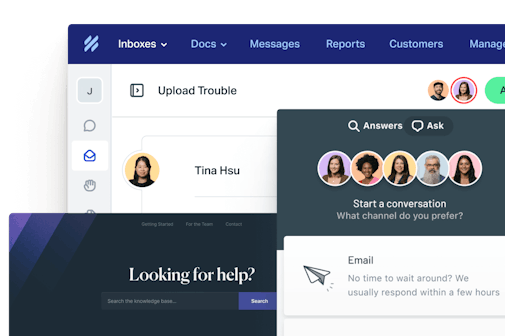The other day, I had a really trying conversation with an online retailer. I’d tried to purchase something, and in the crossed wires of COVID-19, the package never arrived. While the support person was helpful, their friendliness still didn’t negate the fact that I’d waited much longer than expected, with very little information, for something that never arrived. After the interaction finished, I was sent a CSAT survey.
What?!
I’ve heard stories of people trying to cancel subscriptions to premium cable offerings or streaming bundles, as a result of being laid off, only to have their “support” representative try and upsell them during the needlessly difficult process.
Really?!
We recently witnessed Ticketmaster announce they would not provide ticket refunds for concerts and events that were canceled due to COVID-19. It took a New York Times report, customer backlash, and inquiries from members of Congress to finally get the corporate behemoth to backtrack on this disastrous plan.
What were they thinking?!
None of us start our days thinking that we want to be like those companies, yet some of us will still end up there. Here are some ideas about how to be more human in the midst and aftermath of a global pandemic, and how companies can shift their strategies and tactics to accommodate “the new normal.”
This is different
COVID-19 is unlike anything any of us have ever experienced. Large scale crises, such as natural disasters, share many common characteristics, but this pandemic is an outlier.
First, it impacts absolutely everyone. Unlike hurricanes or earthquakes, there is no geography or topography that is immune. Unlike famine, there is no socio-economic class that is protected from its reach (although, per usual, the outcomes and experiences can be very different). There is no escaping it.
Second, we have little certainty as to when it will end. Economic recessions follow a somewhat predictable pattern for gradual recovery, typically aided by changes to monetary and fiscal policies. With COVID-19, there is very little precedence we can draw from. We don’t even have a vaccine yet.
Finally, we have no visibility into what the “new normal” will look like; the future is unclear. Today, businesses are right to focus on survival. We have our hands full just trying to manage our cash flows, support our employees, and still create value for our customers.
But short-term optimizations can render your brand and business at a significant disadvantage in the eyes of your customers, especially if your competitors are moving forward from a place of customer focus.
Our “playbooks” and business continuity plans may feel obsolete, or at least inadequate, in the face of all of this. Many of our business practices and norms have probably started to feel a little off-target as well.
Your KPIs need to change
It’s time to take a closer look at your KPIs and the metrics you value. How do you optimize for customer trust, instead of customer retention?
We need to shift away from the monetary values of tactics and objectives and move toward measuring humanity for the sake of your customers. Recently, I spoke to Banafsheh Ghassemi, CEO and Founder of Tangerine Lab, who gave me an excellent example:
“In this moment when ‘empathy’ is the word of the day, brands should ensure their performance measures gauge their deep understanding of the customers’ needs and expectations and the brand’s success in knocking down barriers for their customers.
If you are a health insurance company, during a pandemic, when the entire population and your customer base is struggling with health-related anxieties, you may want to spend a few extra minutes on the line with your customer to find out how they are feeling, how they are taking care of themselves.”
Let’s talk about what that looks like in practice.
Honesty (and safety) is the only policy
There are tons of excellent examples of companies doing this right, but perhaps the best is Patagonia. For the sake of their employees’ safety, they shut down all of their brick-and-mortar stores and all purchasing through their website.
Rather than choosing to put potential profits from online sales over the safety of their people, they chose honesty and humanity. That’s a move that served them well as they planned and prepared for business post-reopening: They protected their employees, and they were honest with their customers. They showed (and earned) loyalty on both fronts.
Everyone knows that things are a bit messy right now. It’s not going to hurt your relationship with your customers to be honest about the state of your business. Be transparent in setting expectations.
For instance, if you’re in retail and have a long lead time for your products to be available, let your customers know, and not just before purchase, either. When you send your confirmations, let them know again how long they can expect to wait before receiving their order.
It might feel painful to admit that you’re not moving as quickly as you’d like to, but your customers will appreciate it. Knowing what to expect is a much better experience than worrying that you’re never going to hear back or receive the item that you ordered.
Prioritize first response time (FRT)
Even in the event that you can’t get customers the full answers right away, encourage your team members to get first responses to your customers as quickly as possible. Especially right now, people want to know that they are being heard and respected. A first response lets them know that you've seen and heard them and that you’re working on a resolution.
While it may seem tempting to use this as a drive toward first contact resolution (FCR), FRT is going to be more realistic and beneficial to your customers. This is even more true when the solution may be out of your support person’s hands, such as is the case with many retail supply chain issues.
No more drip marketing or macros
How many emails have you gotten letting you know that the company sending the message isn’t a “money business, but a people business”? We should all be people businesses, and we shouldn’t have to send out mass emails to let everyone know. This is not an original message and will, instead, just leave a poor taste in the recipient's mouth.
Sending automated email campaigns projects the message that your customers are little more to you than a number. Put down your macros, canned responses, and marketing email drip campaigns. Use this opportunity where you likely have fewer prospects looking at your site to reach out directly and connect in a human way.
Put away your CSAT/NPS
How can you judge your employees’ performances on things that they have no control over? Poor CSAT and NPS scores can come from anything (and they rarely correlate with quality): supply chain issues, the customer having a bad day outside of reaching out to your company, or product bugginess, to name a few.
None of those things should reflect back on the performance of your support team. Similarly, there’s nothing more frustrating than having a difficult conversation and then being prompted to share how you feel.
What is happening is not your team’s fault. It’s a global issue that is affecting everyone from tiny mom-and-pop shops to giant conglomerates.
CSAT and NPS are great opportunities for customers to vent about their frustrations, both inside and outside of their experiences with your team. Instead of treating CSAT as a metric by which to judge your performance, let it be a safe space for customers to let off some steam instead.
Pause all win-back and anti-churn games
People are being laid off at record levels. This is not the time to shame someone into keeping their subscription for your monthly boxed-goods product. If their credit cards are declined for instance, re-examine your existing messaging and approach. Perhaps this is not the time to try and upsell someone or add to their sense of financial panic.
This is a great opportunity to be generous to the extreme, and do something for them that is unexpected. Make cancellations as easy as possible, with no shame or guilt. Don’t send customers an “Are you sure you want to go?” message. Once they leave, let them go. Don’t pester them to “Please come back!”
Forget about handle time
Have you ever been on the phone with a loved one who you haven’t spoken to in a while and discovered that, when you looked at your phone, you’d already been talking for an hour? That’s what your conversations will be like with many of your customers during this time.
Right now people are isolated. Maybe they need to be heard or to interact with another human. Maybe they need reassurance from another person, or just to feel like they are not alone.
Your support people are primed to do this. They’re empathetic and caring. Don’t push them toward the unnecessary goal of speeding every customer through their interaction. Instead, let them focus on being human and providing a human space for your customers.
Narrow your focus
It can be tempting to try to patch all the holes — especially if your business is suffering — but now is not the time to try to give your team tons to work on. Your hyper-empathetic support team members are already working on a lot. They’re striving to feel useful, valuable, connected, and even therapeutic during such times.
Support teams feel better and more impactful when they can see the changes that they are making in their customers’ lives. According to a survey by Cigna, only about 50% of Americans have "meaningful social interactions" on a daily basis — and that’s what your support team does best.
Instead of finding measures for productivity, work toward narrowing your focus to metrics that specifically indicate the value of your support people. It’s not about how much they are doing but how they are doing it.
The experience doesn’t end with support
Your support and sales teams are the first lenses through which your customers learn about your company, but that doesn’t mean that they are the end-all-be-all. Pay attention to the details in your interactions after the fact.
For example, the instance that anything changes in your shipping policies, product availability, or what you can offer as services, you should be notifying your customers. Anything changing in what they can expect or the level of service that they’ve come to know and love? Communicate it with them humanly. No canned stuff allowed.
Give your customers humanity
Things are changing quickly. We are all a little nervous and maybe even a little up-in-arms. It’s up to you to provide a safe space for your customers and employees to be allowed to feel that, but not succumb to it.
Trim down what you’re expecting from your team members, and refine your strategies for serving your customers. With less to focus on, your support team will be better equipped to help your customers when and how they really need it.
Your customers will appreciate your humanity, especially after the swing over the past ten years toward more mass-production and “I want it now!” mentalities.
People don’t want a canned response. They don’t want you to measure their happiness after they’ve waited for a month for a product that normally takes three days to arrive. What they want is a drop of humanity, a bit of truth and honesty in the face of something genuinely terrifying and unprecedented for all of us. Make sure you give it to them.







